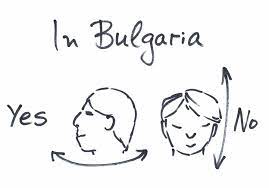Difference between revisions of "Language/Bulgarian/Culture/How-to-say-‘Hello’-in-Bulgarian"
| (2 intermediate revisions by one other user not shown) | |||
| Line 3: | Line 3: | ||
[[File:head nod in Bulgaria PolyglotClub Lesson.jpg|thumb]] | [[File:head nod in Bulgaria PolyglotClub Lesson.jpg|thumb]] | ||
'''здрасти''', Bulgarian Learners! 😃 | '''здрасти''', Bulgarian Learners! 😃 | ||
➡ In today's lesson you will learn how to greet in the Bulgarian language. | ➡ In today's lesson you will learn how to greet in the Bulgarian language. | ||
Happy learning! | Happy learning! | ||
<span link>Take some time to dive into these other pages after completing this lesson:</span> [[Language/Bulgarian/Culture/Bulgarian-Theatre|Bulgarian Culture → Bulgarian Theatre and Performance Arts ...]], [[Language/Bulgarian/Culture/Clothes-in-Bulgaria|Clothes in Bulgaria]], [[Language/Bulgarian/Culture/Public-transportation-in-Bulgaria|Public transportation in Bulgaria]] & [[Language/Bulgarian/Culture/Puppet-Theatre|Puppet Theatre]]. | |||
__TOC__ | __TOC__ | ||
=="Hi" or "Hello"== | =="Hi" or "Hello"== | ||
"hi" or "hello" is usually said as "zdrasti"/"здрасти" or "zdravei"/" | "hi" or "hello" is usually said as "zdrasti"/"здрасти" or "zdravei"/"здравей" when meeting a friend or person your own age. "zdrastite"/"здрастите" or "zdraveite"/"здавейте" is for greeting people formally or greeting more than one person. | ||
==How to greet at different times of the day== | ==How to greet at different times of the day== | ||
| Line 46: | Line 42: | ||
=== How to say Hi and Hello in Bulgarian (здрасти и здравей/те) === | === How to say Hi and Hello in Bulgarian (здрасти и здравей/те) === | ||
<youtube> https://www.youtube.com/watch?v=Dqi9ncg3i0g </youtube> | <youtube> https://www.youtube.com/watch?v=Dqi9ncg3i0g </youtube> | ||
==Sources== | ==Sources== | ||
| Line 53: | Line 48: | ||
* https://www.youtube.com/watch?v=27Hfd853J50 | * https://www.youtube.com/watch?v=27Hfd853J50 | ||
* https://www.youtube.com/watch?v=Dqi9ncg3i0g | * https://www.youtube.com/watch?v=Dqi9ncg3i0g | ||
==Other Lessons== | |||
* [[Language/Bulgarian/Culture/Homes-in-Bulgaria|Homes in Bulgaria]] | |||
* [[Language/Bulgarian/Culture/Markets-and-Supermarkets-in-Bulgaria|Markets and Supermarkets in Bulgaria]] | |||
* [[Language/Bulgarian/Culture/Alphabet|Alphabet]] | |||
* [[Language/Bulgarian/Culture/At-the-restaurant|At the restaurant]] | |||
* [[Language/Bulgarian/Culture/Towns-in-Bulgaria|Towns in Bulgaria]] | |||
* [[Language/Bulgarian/Culture/Bulgaria-Timeline|Bulgaria Timeline]] | |||
* [[Language/Bulgarian/Culture/Family-in-Bulgaria|Family in Bulgaria]] | |||
* [[Language/Bulgarian/Culture/Holidays-in-Bulgaria|Holidays in Bulgaria]] | |||
* [[Language/Bulgarian/Culture/Breakfast-in-Bulgaria|Breakfast in Bulgaria]] | |||
* [[Language/Bulgarian/Culture/Weather-in-Bulgaria|Weather in Bulgaria]] | |||
* [[Language/Bulgarian/Culture/Every-Day-Life-in-Bulgaria|Every Day Life in Bulgaria]] | |||
* [[Language/Bulgarian/Culture/Clothes-in-Bulgaria|Clothes in Bulgaria]] | |||
* [[Language/Bulgarian/Culture/Public-transportation-in-Bulgaria|Public transportation in Bulgaria]] | |||
<span links></span> | |||
Latest revision as of 22:37, 2 January 2024
здрасти, Bulgarian Learners! 😃
➡ In today's lesson you will learn how to greet in the Bulgarian language.
Happy learning!
Take some time to dive into these other pages after completing this lesson: Bulgarian Culture → Bulgarian Theatre and Performance Arts ..., Clothes in Bulgaria, Public transportation in Bulgaria & Puppet Theatre.
"Hi" or "Hello"[edit | edit source]
"hi" or "hello" is usually said as "zdrasti"/"здрасти" or "zdravei"/"здравей" when meeting a friend or person your own age. "zdrastite"/"здрастите" or "zdraveite"/"здавейте" is for greeting people formally or greeting more than one person.
How to greet at different times of the day[edit | edit source]
You can say "Dobr Den!"/"Добър ден!" – "Good afternoon"/"Good morning", at any time of the day (9 a.m. – 6 p.m.). except early morning (before 9am), when you use "Dobro Utro!"/"Добро утро!" – Good morning, and in the evening (after 6pm), when you say "Добър вечер!"/"Dobr vecher!" – Good evening. Before going to bed Bulgarians say "Good night!"/"Лека нощ!".
How to nod your head[edit | edit source]
In most countries around the world, you nod your head to say “Yes” (“Да”) and shake it to say “No” (“Не”). In Bulgaria, it is almost the opposite. When you nod your head for "Yes", it is not quite horizontal, not exactly like most cultures nod "no". The action is rounded a little - but not too much. If you are not sure about the answer, always ask again and listen to the verbal answer.
Handshaking[edit | edit source]
When you meet somebody for the first time you shake hands. Handshaking is appropriate for formal meetings. Some Bulgarians (especially from the older generation) shake hands whenever they meet. Young people (especially girls) kiss each other.
Ciao/Merci[edit | edit source]
Bulgarians often use "Ciao"/"Чао" for "bye" instead of "Dovishdane"“Довиждане“ - this is quite formal and "Мерси"/"Merci" for "thank you" instead of “Благодаря“/"Blagodaria" - also formal. "Ciao-ciao"/"Чао-чао" for "bye" is very informal.
Knowledge of foreign languages[edit | edit source]
Most young Bulgarians have at least a basic knowledge of English or/and a second foreign language (usually German, French or Spanish). Those born before the 1970s are most likely to speak Russian or German. This is especially true in the bigger cities such as Sofia, Plovdiv, Varna and Burgas. In smaller towns, villages and rural areas, many people might not have a knowledge of any foreign languages.
There are also many in Bulgaria who have gained some knowledge of a foreign language from working abroad.
Videos[edit | edit source]
Learn Bulgarian - How to Greet People in Bulgarian[edit | edit source]
How to say Hi and Hello in Bulgarian (здрасти и здравей/те)[edit | edit source]
Sources[edit | edit source]
- https://caritas.bg/cms/wp-content/uploads/2015/04/A1-English.pdf?x10535
- https://www.youtube.com/watch?v=eWryEI378DA
- https://www.youtube.com/watch?v=27Hfd853J50
- https://www.youtube.com/watch?v=Dqi9ncg3i0g
Other Lessons[edit | edit source]
- Homes in Bulgaria
- Markets and Supermarkets in Bulgaria
- Alphabet
- At the restaurant
- Towns in Bulgaria
- Bulgaria Timeline
- Family in Bulgaria
- Holidays in Bulgaria
- Breakfast in Bulgaria
- Weather in Bulgaria
- Every Day Life in Bulgaria
- Clothes in Bulgaria
- Public transportation in Bulgaria


